
IRRIGATION SCIENCE
Scope & Guideline
Unveiling research that shapes the future of irrigation and conservation.
Introduction
Aims and Scopes
- Irrigation Efficiency and Management:
Research on methods and technologies to improve the efficiency of irrigation systems, including drip, sprinkler, and surface irrigation. This includes studies on water use efficiency, irrigation scheduling, and the impact of different irrigation practices on crop yield. - Crop Water Requirements and Coefficients:
Investigation into the water requirements of various crops under different climatic and soil conditions. This includes the establishment and validation of crop coefficients and the assessment of evapotranspiration rates. - Soil-Water-Plant Relationships:
Exploration of the interactions between soil moisture, plant physiology, and irrigation practices. This area includes studies on water stress effects, nutrient uptake, and the physiological responses of plants to different irrigation regimes. - Technological Innovations in Irrigation:
Development and application of new technologies such as remote sensing, UAVs, and IoT for monitoring and managing irrigation systems. This includes data-driven approaches to optimize irrigation practices based on real-time data. - Environmental Impact of Irrigation Practices:
Assessment of the environmental consequences of various irrigation methods, including the effects on soil health, water quality, and ecosystem sustainability. This scope also encompasses the use of recycled water and its implications for agricultural practices.
Trending and Emerging
- Precision Irrigation Technologies:
There is an increasing emphasis on precision irrigation techniques that utilize data from soil moisture sensors, UAVs, and remote sensing technologies. This trend is crucial for optimizing water use and improving crop yields in variable climatic conditions. - Sustainable Water Management Practices:
Research focused on sustainable irrigation practices, including the use of reclaimed water, mulching, and deficit irrigation strategies, is gaining traction. This reflects a broader concern for water conservation and environmental sustainability in agricultural practices. - Integration of Machine Learning and Data Analytics:
Emerging studies are increasingly employing machine learning algorithms and data analytics to predict irrigation needs and optimize water use. This trend highlights the importance of data-driven decision-making in modern irrigation management. - Climate Change Adaptation Strategies:
Research addressing the impacts of climate change on irrigation practices and crop water requirements is becoming more prominent. This includes studies on irrigation adjustments in response to changing weather patterns and their implications for food security. - Impact of Irrigation on Soil Health and Ecosystem Services:
There is a growing focus on understanding how different irrigation practices affect soil health and ecosystem services. This includes studies on soil salinity, fertility, and the role of irrigation in maintaining ecological balance.
Declining or Waning
- Traditional Irrigation Practices:
There is a noticeable decrease in studies focusing solely on conventional irrigation methods without integrating modern technologies or sustainability aspects. This shift reflects a broader move towards innovative practices that enhance efficiency and reduce environmental impacts. - Generalized Crop Studies without Contextual Adaptation:
Research that does not tailor irrigation practices to specific local conditions, such as climate or soil type, is becoming less frequent. The focus is now more on localized studies that consider the unique characteristics of specific agricultural systems. - Basic Agronomic Studies:
The publication of papers that focus solely on agronomic practices without a clear link to irrigation technology or water management strategies is declining. The trend is moving towards interdisciplinary studies that combine agronomy with advanced irrigation methodologies.
Similar Journals
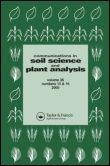
COMMUNICATIONS IN SOIL SCIENCE AND PLANT ANALYSIS
Cultivating Knowledge for Sustainable AgricultureCOMMUNICATIONS IN SOIL SCIENCE AND PLANT ANALYSIS, published by Taylor & Francis Inc, is a prestigious journal dedicated to advancing research in the fields of agronomy, crop science, and soil science. Established in 1970, the journal has maintained a significant presence over the years, with a commitment to publishing high-quality, peer-reviewed articles that contribute to the understanding of soil and plant interactions. With an impressive Q2 ranking in both Agronomy and Soil Science, it positions itself as a vital resource for researchers, professionals, and students alike, keen on exploring innovative solutions to contemporary agricultural challenges. Although it currently does not provide open access, the journal ensures wide dissemination through its established subscription services. The journal's focus on empirical research, methodologies, and technological advancements in soil management and plant nutrition makes it an essential platform for disseminating knowledge and fostering discussions within the scientific community. Located in the heart of Philadelphia, USA, it remains a significant contributor to the global dialogue on sustainable agriculture and environmental stewardship.

Turkish Journal of Field Crops
Transforming Agriculture Through Cutting-Edge ResearchTurkish Journal of Field Crops is a prestigious peer-reviewed publication dedicated to advancing the field of agronomy and crop science, published by the Society of Field Crop Science. With an ISSN of 1301-1111, this journal serves as a crucial platform for researchers and professionals to disseminate innovative findings and discuss practical applications in crop cultivation and management. Hailing from Turkey, it aims to address the pressing challenges facing agriculture in both regional and global contexts, particularly over its converged years from 2009 to 2024. As a Q3 ranked journal in the Agronomy and Crop Science category with a Scopus ranking of #259/406 and a percentile of 36th, it fosters high-quality research that contributes to the sustainable development of field crops. Though it operates under various access options, this journal is committed to providing valuable insights into agronomic practices, aiming to bridge the gap between theory and application for scientists, educators, and practitioners alike.

Paddy and Water Environment
Innovating solutions for a sustainable water and paddy ecosystem.Paddy and Water Environment is a pivotal journal published by Springer Heidelberg, dedicated to advancing the fields of Agronomy, Environmental Engineering, and Water Science and Technology. Established in 2005, this esteemed journal focuses on the complex interactions between paddy cultivation and water management, addressing critical issues related to sustainable agriculture and environmental preservation. With an impressive performance in Scopus rankings—holding Q2 positions across multiple categories and showcasing a commendable publication impact—this journal serves as an essential resource for researchers, professionals, and students alike. Paddy and Water Environment provides insightful research articles, reviews, and case studies that contribute to the understanding of the intricate relationships between the environment and agricultural practices, promoting strategies for sustainable development. Subscribers benefit from access to a wealth of knowledge, underscoring the journal's significance in fostering scientific inquiry and innovation within its domain.

Transactions of the ASABE
Pioneering research for a sustainable agricultural landscape.Transactions of the ASABE is a premier journal published by the American Society of Agricultural and Biological Engineers, specializing in innovative research and practical applications in the fields of agricultural and biological engineering. With an ISSN of 2151-0032 and E-ISSN 2151-0040, this journal has established a vital niche in disseminating high-quality scholarly content that addresses the complex challenges faced in agriculture and biological systems. The journal operates under an open access model, facilitating broad dissemination of research findings to a global audience. This commitment to accessibility is reflected in its coverage of diverse topics, including agriculture, soil science, food science, and environmental engineering. Although the journal's coverage in Scopus was discontinued in 2021, it once ranked among the top in its categories, indicating its significant contribution to advancing knowledge in these essential fields. Researchers, practitioners, and students are encouraged to engage with the Transactions of the ASABE to stay abreast of developments and foster collaboration in promoting sustainable engineering solutions.
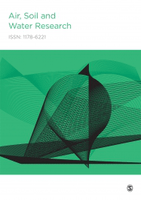
Air Soil and Water Research
Empowering Research for a Healthier PlanetAir Soil and Water Research is a premier open access journal published by SAGE Publications Ltd, dedicated to the interdisciplinary study of environmental science. Since its inception in 2008, this journal has provided a vital platform for researchers and professionals to disseminate findings that enhance our understanding of the interconnectedness of air, soil, and water systems. With an impressive impact factor and a ranking of #43 out of 233 in the General Environmental Science category, the journal proudly occupies the Q2 quartile within its field, demonstrating its influence and contribution to environmental research. The journal's editorial board comprises leading scientists and experts committed to ensuring high-quality publications that address important environmental challenges. Accessible to all, it provides a wealth of knowledge and resources for academics, practitioners, and policymakers looking for innovative solutions to pressing ecological issues.
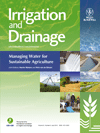
IRRIGATION AND DRAINAGE
Transforming agricultural strategies through cutting-edge research.IRRIGATION AND DRAINAGE, published by Wiley, is a prestigious academic journal that focuses on the critical fields of agronomy, crop science, and soil science. With an ISSN of 1531-0353 and an E-ISSN of 1531-0361, this journal serves as an essential platform for disseminating innovative research and insights relevant to the management of irrigation systems and drainage in agricultural practices. Based in the United Kingdom, the journal has shown a significant impact in its field, boasting a 2023 ranking in the Q2 quartile for both Agronomy and Crop Science and Soil Science. It ranks #149 out of 406 in Agricultural and Biological Sciences for Agronomy and Crop Science, and #66 out of 159 in Soil Science, placing it within the 58th to 63rd percentiles. This journal not only aims to advance knowledge in the sustainable management of water resources and soil health but also encourages open access to its content, making significant findings more accessible to researchers, professionals, and students alike. As it approaches its convergence period from 2001 to 2024, the importance of IRRIGATION AND DRAINAGE in shaping effective agricultural strategies continues to grow, fostering dialogue and innovation among its readership.
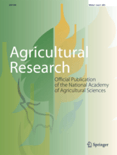
AGRICULTURAL RESEARCH
Bridging knowledge and practice in agronomy and crop science.AGRICULTURAL RESEARCH is a distinguished academic journal published by SPRINGER INDIA, focusing on the dynamic fields of Agronomy, Crop Science, and Food Science. With an ISSN of 2249-720X and E-ISSN of 2249-7218, this journal has established itself as a valuable resource for researchers, professionals, and students dedicated to advancing agricultural knowledge and practices. The journal is recognized in the 2023 Scopus Rankings, achieving commendable quartile positions, including Q2 in Agronomy and Crop Science and Plant Science, as well as Q3 in Food Science, indicating its influential presence in the academic community. AGRICULTURAL RESEARCH aims to disseminate cutting-edge research findings, innovative methodologies, and comprehensive reviews, fostering collaboration and discussion among scholars in Switzerland and beyond. Through its commitment to scholarly excellence, this journal is pivotal in addressing contemporary challenges in agriculture, ensuring sustainability, and enhancing food security for the future.

Journal of the ASABE
Connecting Experts to Innovate in Agriculture and BeyondJournal of the ASABE, published by the American Society of Agricultural and Biological Engineers, serves as a pivotal platform for disseminating cutting-edge research in various disciplines, including Agronomy, Crop Science, Biomedical Engineering, Food Science, Forestry, and Soil Science. With an impact factor that reflects its significance and reach, the journal ranks in the Q2 and Q3 quartiles across numerous categories in 2023, showcasing its commitment to advancing knowledge in agricultural and biological engineering. Authored by leading experts, the journal offers accessible articles on innovative methodologies, technologies, and sustainable practices essential to the global agricultural and environmental landscape. Open access options ensure that research findings are readily available to a broad audience, promoting collaboration and knowledge sharing among researchers, professionals, and students alike. With a strategic focus on research convergence into 2024, Journal of the ASABE is poised to shape the future of engineering solutions in agriculture and beyond.
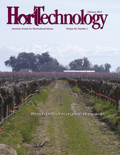
HORTTECHNOLOGY
Transforming horticulture through open-access knowledge.HORTTECHNOLOGY is a premier open-access journal published by the American Society for Horticultural Science, focusing on innovative research and advancements in the field of horticulture. With an ISSN of 1063-0198 and an E-ISSN of 1943-7714, this esteemed journal has been disseminating valuable information since 1993 and continues to be a key resource with a convergence period extending to 2024. HORTTECHNOLOGY holds a reputable position in the academic community, classified in the Q2 quartile for horticulture, reflecting its significance and quality within the discipline. Its current Scopus rank places it at 49 out of 115 within Agricultural and Biological Sciences - Horticulture, positioning it in the 57th percentile. Researchers, professionals, and students alike benefit from the accessible research findings this journal offers, addressing critical challenges and advancing knowledge in horticultural practices. HORTTECHNOLOGY is committed to fostering scientific progress and open dialogue within the horticultural community, making it an invaluable resource for anyone passionate about the field.
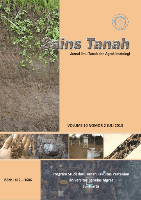
SAINS TANAH
Cultivating Knowledge for a Sustainable FutureSAINS TANAH is a renowned peer-reviewed journal that focuses on the fields of agronomy, soil science, and environmental studies, published by Universitas Sebelas Maret Surakarta in Indonesia. Established as an Open Access platform since 2001, it aims to disseminate high-quality research that addresses critical issues in soil health, crop management, and pollution, thereby fostering sustainable agricultural practices. With its current impact factor demonstrating a Category Quartile ranking of Q3 and Q4 in major areas such as Agronomy and Crop Science, Atmospheric Science, and Pollution, SAINS TANAH serves as an essential resource for researchers, professionals, and students dedicated to advancing knowledge and solutions in these vital fields. By providing a collaborative environment and upholding rigorous academic standards, the journal not only highlights the significance of Indonesian research contributions but also aims to connect local insights with global agricultural and environmental challenges.